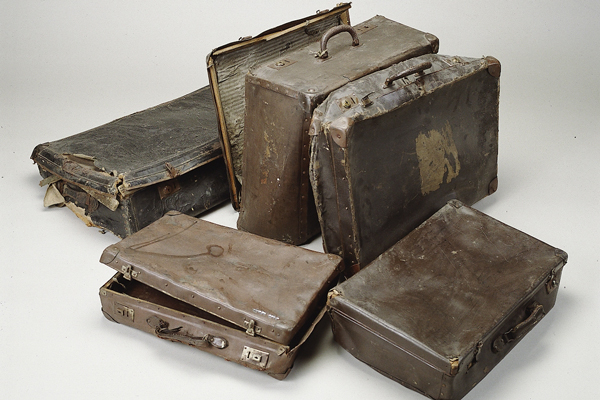
Suitcases confiscated from prisoners at the Auschwitz concentration camp, circa 1941–45. Panstwowe Muzeum Auschwitz-Birkenau w Oswiecimiu
2020 Monna and Otto Weinmann Digital Lecture
7 p.m. ET/4 p.m. PT
The Nazi campaign to rid Europe of its Jews started with seizing their property and possessions. The Third Reich deprived Jewish families of the things that made their dwellings a home—clothes, books, tools, photographs, and keepsakes. Before their exile or deportation, many people buried valued items, entrusted cherished goods to neighbors, or shipped belongings abroad. Some prisoners made clothing, jewelry, spoons, and combs in the concentration camps that survivors or others carefully preserved. After the war, while most of what Jews owned was gone, some possessions were salvaged or reclaimed.
Now, as survivors age—and Holocaust denial is a rising threat—ownership of these objects can be contentious, raising questions such as: Should public institutions hold Holocaust artifacts as crucial evidence of the crimes and as educational resources? When do families have a right to keep mementos as connections to their past?
Using three case studies, this conversation will explore the material traces of the Holocaust and the ongoing struggles over who owns them.
Opening remarks
Janice Weinman Shorenstein, Executive Director and CEO, Hadassah
Speaker
Leora Auslander, Arthur and Joann Rasmussen Professor in Western Civilization and Professor of Modern European Social History, University of Chicago
Moderator
Lisa Leff, Director, Jack, Joseph and Morton Mandel Center for Advanced Holocaust Studies
Join the conversation during the virtual program. After the speakers finish their discussion, you will have an opportunity to ask questions. Please submit your question(s) in the YouTube comments section. If you are not able to do that because you do not have a Google email account, please submit your questions to calendar@ushmm.org.
This program is free and open to the public, but registration is required.
For more information, please contact Katharine White at kwhite@ushmm.org.
The Monna and Otto Weinmann Annual Lecture honors Holocaust survivors and their fates, experiences, and accomplishments. Monna Steinbach Weinmann (1906–1991), born in Poland and raised in Austria, fled to England in autumn 1938. Otto Weinmann (1903–1993), born in Vienna and raised in Czechoslovakia, served in the Czechoslovak, French, and British armies; was wounded at Normandy; and received the Croix de Guerre for his valiant contributions during the war. Monna Steinbach and Otto Weinmann married in London in 1941 and immigrated to the United States in 1948.
This annual lecture has been made possible by Janice Weinman Shorenstein.
